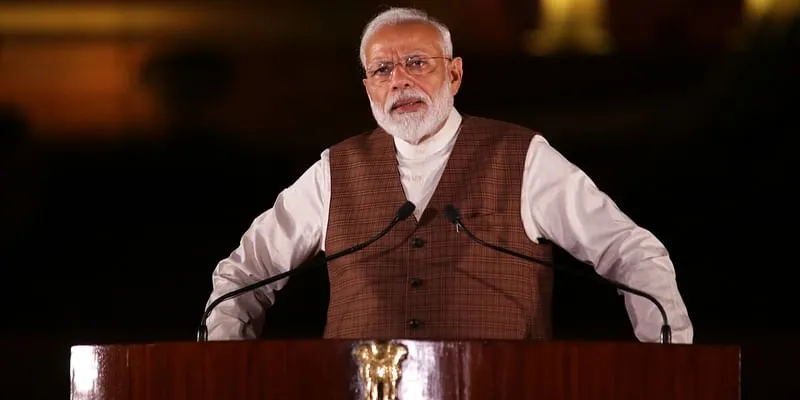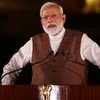Due to 'right decisions taken at right time', India better placed in COVID-19 fight: PM Modi
India's recovery rate is higher than other countries and is improving on a daily basis, PM Modi said, adding that the total number of people who have recovered from the virus is about to reach the 10 lakh mark.
India is in a much better position than other countries in the fight against COVID-19 as a result of "right decisions taken at the right time", Prime Minister Narendra Modi said on Monday, asserting that the country has expanded its health infrastructure at a rapid pace to deal with the pandemic.
Speaking after virtually launching COVID-19 testing facilities in Noida, Mumbai, and Kolkata, PM Modi said that in the fight against coronavirus, India has come to a point where it does not lack in awareness; its scientific data is expanding and resources are also increasing.

Prime Minister Narendra Modi
During the COVID-19 pandemic, everyone is working with only one determination that each and every Indian has to be saved, Modi said, adding this resolve has given astonishing results in the country.
Due to the "right decisions taken at the right time" in the country, India is in a much better position than other countries in the fight against the pandemic, he said.
The deaths due to the coronavirus in India are much lower than many big countries, the prime minister said.
Noting that India's recovery rate is also higher than other countries and is improving on a daily basis, Modi said the total number of people who have recovered from the virus is about to reach the 10 lakh mark.
The virtual launch event was attended by Union Health Minister Harsh Vardhan and the chief ministers of Maharashtra, West Bengal, and Uttar Pradesh — Uddhav Thackeray, Mamata Banerjee and Yogi Adityanath.
Prime Minister Modi said it was imperative for the country to develop corona-specific health infrastructure at a fast pace and pointed out that this was the reason that the Centre had announced a package of Rs 15,000 crore at the beginning of the COVID-19 battle.
The country now has more than 11,000 COVID-19 facilities and more than 11 lakh isolation beds, Modi said.
"While the country had only one COVID testing centre in January this year, there are almost 1,300 such labs now," he said.
At present, more than five lakh tests are being conducted in the country daily, and efforts are underway to increase this capacity to 10 lakh in the coming weeks, he said.
Modi also noted that the country has become the second largest PPE kit manufacturer and has progressed from not having even a single PPE kit manufacturer as recently as six months ago, to having more than 1,200 manufacturers now, who are producing more than five lakh such kits daily.
The prime minister also highlighted that from being dependent on imports, now more than three lakh N-95 masks are being produced in the country daily, annual production capacity of ventilators has become three lakh and there has also been a significant increase in the production of medical oxygen cylinders.
This has not only helped save lives but has also converted India from an importer to an exporter, he observed.
Talking about efforts to contain the spread of the virus in rural areas, Prime Minister Modi said there is a need to develop new health infrastructure as well as boost the already existing health infrastructure facilities in the villages.
Apart from developing the physical infrastructure, the country has also managed to swiftly ramp up human resources including paramedics, ASHA workers and Anganwadis, who have played a significant part in controlling the spread of the pandemic, he said.
Modi also emphasised the need to work on continuously attaching new and retired health professionals with the health system in order to prevent fatigue from setting in "our corona warriors".
In his address, Modi urged the people to be cautious during the celebrations of upcoming festivals in order to check the spread of the virus.
He underlined that the benefits of the Pradhan Mantri Garib Kalyan Anna Yojna under which free ration was being given should reach the poor timely.
"Our scientists are working fast to develop a vaccine against coronaivrus. But, till the time an effective medicine or vaccine is not ready, 'do-gaz doori' (six feet distance), wearing masks and hand sanitisation are the only alternatives," the prime minister asserted.
Health Minister Harsh Vardhan said that labs to test for COVID-19 are now available all across the country.
Vardhan also spoke about Union Home Minister Amit Shah working along with Delhi Chief Minister Arvind Kejriwal in order to control the spread of the virus in the national capital, a PMO statement said.
The new testing facilities will give West Bengal, Maharashtra and Uttar Pradesh more strength to fight COVID-19, Modi said.
The prime minister said these hi-tech state-of-the-art testing facilities will boost the testing capacity by almost 10,000 daily tests in each of the three cities.
More number of tests will assist early detection and treatment, thereby helping fight the spread of the virus, he said.
These labs will not be limited to testing for COVID, but in future they will also be able to test for Hepatitis B and C, HIV, Dengue and several other diseases, Modi noted.
The three high-tech testing facilities have been set up strategically at ICMR institutions — National Institute of Cancer Prevention and Research in Noida, National Institute for Research in Reproductive Health in Mumbai, and National Institute of Cholera and Enteric Diseases in Kolkata.
Edited by Kanishk Singh








